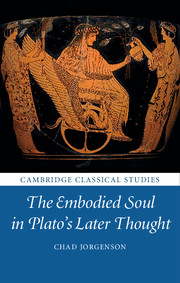Book contents
- The Embodied Soul in Plato’s Later Thought
- Cambridge Classical Studies
- The Embodied Soul in Plato’s Later Thought
- Copyright page
- Dedication
- Contents
- Preface
- Introduction
- Chapter 1 Thymos
- Chapter 2 Appetitive Soul
- Chapter 3 Rational Soul
- Chapter 4 Measuring Pleasure
- Chapter 5 Eudaimonia
- Chapter 6 The Political Sphere
- Chapter 7 Eschatology
- Conclusion
- Bibliography
- Index Locorum
- General Index
Chapter 7 - Eschatology
Published online by Cambridge University Press: 23 March 2018
- The Embodied Soul in Plato’s Later Thought
- Cambridge Classical Studies
- The Embodied Soul in Plato’s Later Thought
- Copyright page
- Dedication
- Contents
- Preface
- Introduction
- Chapter 1 Thymos
- Chapter 2 Appetitive Soul
- Chapter 3 Rational Soul
- Chapter 4 Measuring Pleasure
- Chapter 5 Eudaimonia
- Chapter 6 The Political Sphere
- Chapter 7 Eschatology
- Conclusion
- Bibliography
- Index Locorum
- General Index
Summary
- Type
- Chapter
- Information
- The Embodied Soul in Plato's Later Thought , pp. 164 - 200Publisher: Cambridge University PressPrint publication year: 2018

